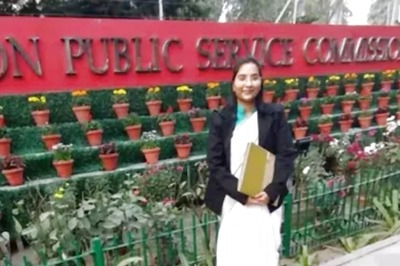
views
New Delhi: The 2018 Economic Survey tabled by Union Finance Minister Arun Jaitley makes a strong case for representation of women in the Parliament. It draws a comparison with Rwanda which had more than 60 percent of its women in its Parliament in 2017; Indian, on the other hand, had only 11 percent of them in its Parliament.
Curiously, the survey does not mention the Women's Reservation Bill [The Constitution (108th Amendment) Bill, 2008, which is still stuck in the Lok Sabha.
The survey, prepared by Chief Economic Advisor, Arvind Subramanian, has noted that “between 2010 and 2017 women’s share rose 1 percentage point in its Lower house". However, it also admits that “in a country like India with around 49 per cent of women in the population, the political participation of women has been low".
As per the report ‘Women in Politics 2017 (IPU & UN)’ Lok Sabha had 64 (11.8 percent of 542 MPs) and Rajya Sabha had 27 (11 per cent of 245 MPs) women MPs. As on October 2016, out of the total 4118 MLAs across the country, only 9 percent were women.
Among the State Assemblies, the highest percentage of women MLAs were from Bihar, Haryana and Rajasthan with 14 per cent; Madhya Pradesh and West Bengal with 13 per cent; and Punjab with 12 per cent.
However, one of the key points which could ensure reservation to women in Indian parliament failed to find mention in the Economic survey.
The proposal to make provisions for women's reservation in Parliament and the state assemblies was first echoed by the late Prime Minister Rajiv Gandhi. After numerous hurdles, Women's Reservation Bill was introduced by the UPA in 2008 and passed by the Rajya Sabha in 2010. Yet, the bill languishes in the Lok Sabha till date.
Former Congress president Sonia Gandhi recently wrote a letter to PM Narendra Modi, urging him to take advantage of the majority his party enjoys and ensure its passage in the Lok Sabha.
The Parliamentary Standing Committee on Law and Justice, and Personnel recommended passage of the Bill in Dec 2009. The Bill was cleared by the Union Cabinet on February 25, 2010.
Although, the survey does mentions the constitutional provisions that demand reservation for women.
Article 243D (3) of the Constitution of India provides that not less than one third of the total number of seats be reserved for women. Further, Article 243 D (4) provides that not less than one third of the total offices of Chairpersons in Panchayats at each level shall be reserved for women.
The survey notes that “there has been substantial representation of women at the local government levels but varies from State to State".
The survey revealed that there are 13.72 lakh elected women representatives (EWRs) in PRIs which constitute 44.2 percent of total elected representatives (ERs) as on December, 2017. Women sarpanchs accounted for 43 percent of total gram panchayats (GPs) across the country, exhibiting active leadership of women in local governments.
According to the 2008 Inter-Parliamentary Union (IPU), Equality in Politics: A survey of Women and Men in Politics, domestic responsibilities are the primary reason why women keep away from politics whereas for men it is the lack of support from the electorate.















Comments
0 comment